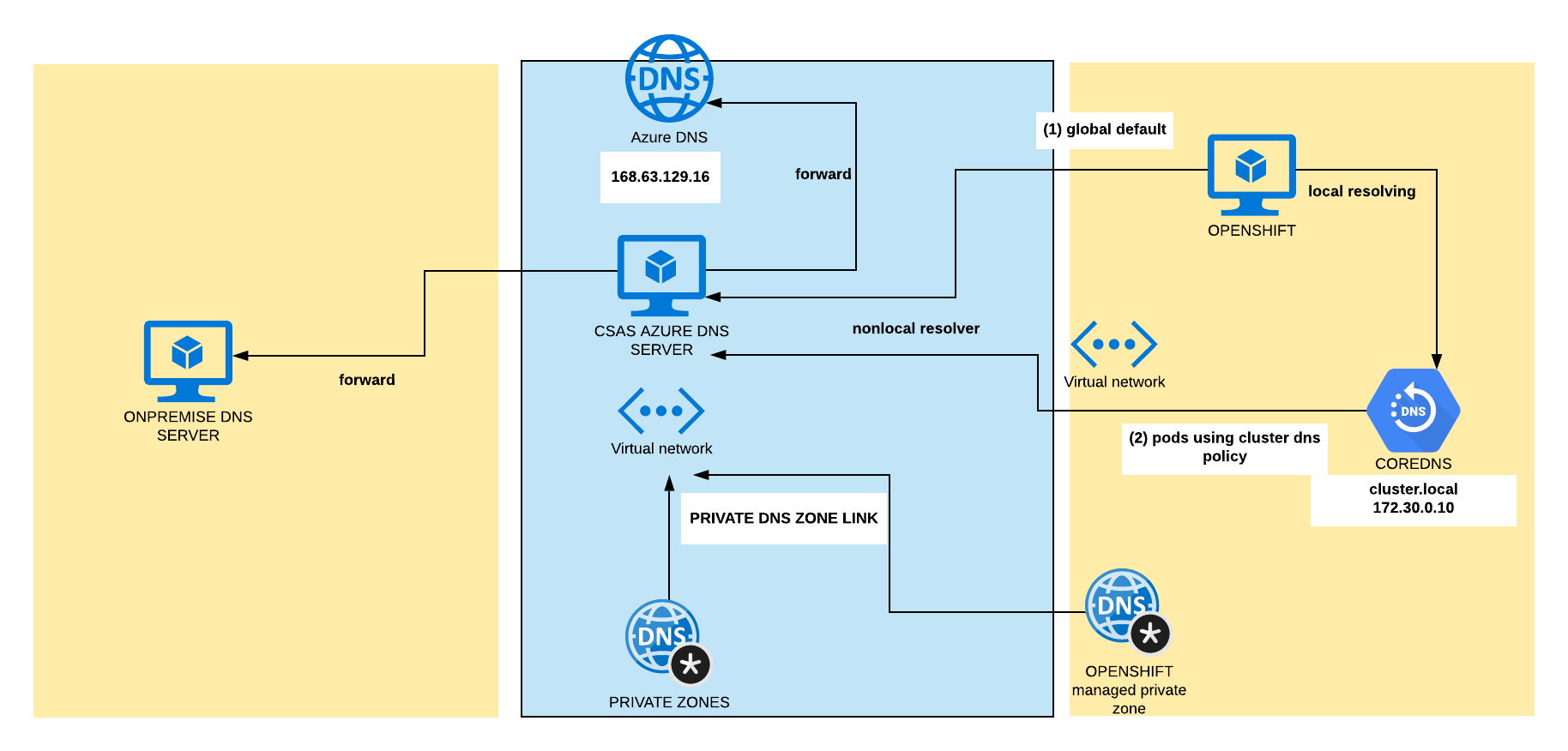DNS deepDive OPC/Azure/OnPremise

DNS operator in Openshift
In Openshift 4, the DNS Operator deploys and manages CoreDNS to provide a name resolution service to pods, enabling DNS-based Kubernetes Service discovery in OpenShift. The DNS Operator implements the dns API from the operator.openshift.io API group. The operator deploys CoreDNS using a DaemonSet, creates a Service for the DaemonSet, and configures the kubelet to instruct pods to use the CoreDNS Service IP for name resolution.
# get dns clusteroperator
oc describe clusteroperators/dns
# get operator configuration
oc get dnses.operator.openshift.io/default -o yaml
apiVersion: operator.openshift.io/v1
kind: DNS
spec: {}
status:
clusterDomain: cluster.local
clusterIP: 172.30.0.10
spec is empty here, we will put some records later
# get dns configuration
# keep in mind we are using public instalation(publicZone)
oc get dns.config.openshift.io/cluster -o yaml
apiVersion: config.openshift.io/v1
kind: DNS
spec:
baseDomain: toshi44.sudlice.org
privateZone:
id: /subscriptions/7504de90-f639-4328-a5b6-fde85e0a7fd9/resourceGroups/toshi44-dkxzr-rg/providers/Microsoft.Network/privateDnsZones/toshi44.sudlice.org
# for Internal installation this part is empty
publicZone:
id: /subscriptions/7504de90-f639-4328-a5b6-fde85e0a7fd9/resourceGroups/ocp42-shared/providers/Microsoft.Network/dnszones/sudlice.org
status: {}
CoreDNS in OpenShift
- Every Pod is assigned a DNS name: pod-ip.namespace-name.pod.cluster.local (A/AAAA record)
- Every Service is assigned a DNS name: svc-name.namespace-name.svc.cluster.local (SRV record)
- CoreDNS as DaemonSet
oc get configmap/dns-default -n openshift-dns -o yaml
# rsh to one of CoreDNS pod
oc rsh -n openshift-dns dns-default-24fm8 bash
cat /etc/coredns/Corefile
.:5353 {
errors
health
kubernetes cluster.local in-addr.arpa ip6.arpa {
pods insecure
upstream
fallthrough in-addr.arpa ip6.arpa
}
prometheus :9153
forward . /etc/resolv.conf {
policy sequential
}
cache 30
reload
}
kubernetes cluster.local in-addr.arpa ip6.arpa {
this enables a plugin that configure CoreDNS will reply to DNS queries based od IP of the services and pods of Kubernetes. (cluster.local handle all queries in this zone and also reverse dns lookups - in-addr.arpa)
forward . /etc/resolv.conf {
policy sequential
}
cat /etc/resolv.conf
# smh4lkfvymeuzcx1vpi1e15wih is generated for each installation
search smh4lkfvymeuzcx1vpi1e15wih.ax.internal.cloudapp.net
nameserver 168.63.129.16
this enables forwarding plugin for non cluster domain of Kubernetes. By default it use node’s /etc/resolv.conf.
or config map for configuration
oc get configmap/dns-default -n openshift-dns -o yaml
RESOLVING from POD
Related options are
- “Default”: The Pod inherits the name resolution configuration from the node that the pods run on.
Default case is
search smh4lkfvymeuzcx1vpi1e15wih.ax.internal.cloudapp.net
nameserver 168.63.129.16
- “ClusterFirst”: Any DNS query that does not match the configured cluster domain suffix, is forwarded to the upstream nameserver inherited from the node. Cluster administrators may have extra stub-domain and upstream DNS servers configured. See related discussion for details on how DNS queries are handled in those cases.
Default case is:
search {namespace}.svc.cluster.local svc.cluster.local cluster.local smh4lkfvymeuzcx1vpi1e15wih.ax.internal.cloudapp.net
nameserver 172.30.0.10
options ndots:5
If not specified ClusterFirst is used not Default.
Because A or AAAA records are not created for Pod names, hostname is required for the Pod’s A or AAAA record to be created. A Pod with no hostname but with subdomain will only create the A or AAAA record for the headless service (default-subdomain.my-namespace.svc.cluster-domain.example), pointing to the Pod’s IP address. Also, Pod needs to become ready in order to have a record unless publishNotReadyAddresses=True is set on the Service
list dnsPolicy for pods in cluster:
oc get pods --all-namespaces -o json|jq -r '.items[]|{name: .metadata.name,namespace: .metadata.namespace,dnsPolicy: .spec.dnsPolicy}'
Configure DNS forwarding in DNS clusterOperator
In fact there are two separate options with almost same effect but different approach.
Configuration for appPods using CoreDNS service (dnsPolicy: ClusterFirst)
Operator can be modified to forward to specific DNS for defined “zones”. This modification will allow application pods running inside the cluster to resolve names hosted on a private DNS server outside the cluster.
oc get dnses.operator.openshift.io/default -o yaml
apiVersion: operator.openshift.io/v1
kind: DNS
spec: {}
status:
clusterDomain: cluster.local
clusterIP: 172.30.0.10
#can be modified to
apiVersion: operator.openshift.io/v1
kind: DNS
spec:
servers:
- forwardPlugin:
upstreams:
- 10.1.1.12
name: zone-forward
zones:
- sudlice.cz
status:
clusterDomain: cluster.local
clusterIP: 172.30.0.10
Change default resolver for nodes
In Azure default resolver for nodes is Azure DNS (nameserver 168.63.129.16), all requests not hitting “clusterDomain” in our case “cluster.local” are forwarded to.
to modify this setting to use custom DNS server:
apiVersion: machineconfiguration.openshift.io/v1
kind: MachineConfig
metadata:
labels:
machineconfiguration.openshift.io/role: worker
name: 56-worker-resolver
spec:
config:
ignition:
version: 2.2.0
storage:
files:
- contents:
source: |
search smh4lkfvymeuzcx1vpi1e15wih.ax.internal.cloudapp.net
nameserver 10.1.1.4
verification: {}
filesystem: root
mode: 420
path: /etc/resolv.conf
